- Biography
- Repertoire
- Discography
- Reviews
- Itinerary
- Misha & Cipa
- Media
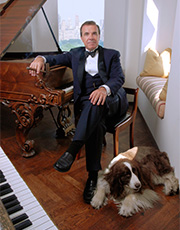
Now in the sixth decade of a distinguished global career, MISHA DICHTER remains one of America’s most popular artists, extending a musical heritage from the Russian Romantic School, as personified by Rosina Lhevinne, his mentor at The Juilliard School, and the German Classical style that was passed on to him by Aube Tzerko, a pupil of Artur Schnabel. He also studied composition and analysis with Leonard Stein, a disciple of Arnold Schoenberg.
Born in Shanghai to parents who had fled Poland at the outbreak of World War II, Misha Dichter and his family moved to Los Angeles when he was two; he began studying the piano at five. At the age of 20, while enrolled at the famed Juilliard School in New York City, he won the Silver Medal at the 1966 International Tchaikovsky Competition in Moscow, which helped launch an enviable concert career. Shortly thereafter, on August 14, 1966, Mr. Dichter was the guest soloist in a Tanglewood performance of Tchaikovsky’s Piano Concerto No. 1 with Erich Leinsdorf and the Boston Symphony Orchestra, a concert that was broadcast nationally on NBC and subsequently recorded for RCA. Two years later, he made his New York Philharmonic debut under the baton of Leonard Bernstein, collaborating on the same concerto. Appearances with the Berlin Philharmonic, Amsterdam’s Concertgebouw Orchestra, the principal London orchestras and every major American orchestra soon followed.
A recognized champion of Leonard Bernstein’s Symphony #2, Age of Anxiety, Misha Dichter performed this great work with David Zinman and the Chicago Symphony Orchestra at the 2016 Ravinia Festival. He has collaborated on Age of Anxiety with Maestro Zinman and the Deutsches Symphonie-Orchester Berlin, David Itkin and the University of North Texas Symphony Orchestra and Ward Stare and the Rochester Philharmonic Orchestra.
Misha Dichter’s discography on the Philips, RCA, MusicMasters and Koch Classics labels are legendary, iconic and musically omnivorous, encompassing the major scores of Beethoven, Brahms, Chopin, Gershwin, Liszt, Mussorgsky, Schubert, Schumann, Stravinsky and Tchaikovsky. A noted exponent of Liszt’s piano works and a champion of the composer’s forward-looking contributions to the development of music, Mr. Dichter was honored in 1988 with the “Grand Prix International du Disque Liszt,” presented for his Philips recording of the master’s piano transcriptions. His first recording with Cipa Dichter is a three-CD set of Mozart’s complete piano works for four hands and is available on the Nimbus label. American Record Guide called the album “an unmitigated delight,” and Music Web International named it a 2005 “Record of the Year.” In 2024, Newton Classics reissued his Philips album of Liszt’s complete Hungarian Rhapsodies, performances newly hailed by Gramophone as “From Dichter everything is deeply considered, every musical possibility explored and this, combined with a comprehensive and unfaltering technique, makes the reappearance of his presentation a special contribution to the Liszt celebrations.”
In 2007, Misha Dichter took a three-month hiatus from the concert stage to deal with the onset of Dupuytren’s Disease, a contracting of one or more fingers. After totally successful surgery and physical therapy, Mr. Dichter returned to public performance and became a supporter of, and spokesperson for, the American Society for Surgery of the Hand. A brief audio/video presentation, “Dupuytren’s Contracture: Misha Dichter - A Pianist Reborn,” is accessible on YouTube.
Misha Dichter is an accomplished writer, having contributed articles to many leading publications, including The New York Times. He is also a talented sketch artist, and in 2012 an e-book of his music-related illustrations, “A Pianist’s World in Drawings,” was released by Rosetta Books. Available on Amazon.com, BN.com and from iTunes, the e-book compiles over 50 original drawings that were created over the span of Mr. Dichter’s half-century career. (For more information, visit www.apianistsworldindrawings.com)
Fiercely dedicated to extending his artistic traditions to new generations of pianists, Misha Dichter conducts widely attended masterclasses at major conservatories, universities and music festivals, including Aspen, Curtis, Eastman, Harvard, Juilliard, Yale and Holland’s Conservatorium van Amsterdam.
Misha Dichter and his wife, Cipa Dichter, reside in New York City, in a household ruled over by Baxter, their amiable Springer Spaniel. They have two sons and five grandchildren.
BARTÓK
Concerto #3 (1945)
BEETHOVEN
Concerto #1 in C, Op. 15
Concerto #2 in B-flat, Op. 19
Concerto #3 in c, Op. 37
Concerto #4 in G, Op. 58
Concerto #5 in E-flat, Op. 73 ("Emperor")
Concerto in C, Op. 56 ("Triple")
Fantasia in c, Op. 80 ("Choral Fantasy")
BERNSTEIN
Symphony #2 ("Age of Anxiety")
BRAHMS
Concerto #1 in d, Op. 15
Concerto #2 in B-flat, Op. 83
GERSHWIN
Concerto in F
Rhapsody in Blue
GRIEG
Concerto in a, Op. 16
LISZT
Concerto #1 in E-flat
MOZART
Concerto #17 in G, K. 453
Concerto #20 in d, K. 466
Concerto #21 in C, K. 467
Concerto #23 in A, K. 488
RACHMANINOFF
Concerto #2 in c, Op. 18
Rhapsody on a Theme of Paganini, Op. 43
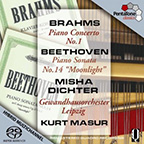 |
BRAHMS: Concerto #1 in d, Op. 15 Kurt Masur/Gewandhausorchester Leipzig BEETHOVEN: Piano Sonata #14 in c#, Op. 27, #2 (“Moonlight”) PentaTone: PTC 5185 124 |
 |
BRAHMS: Concerto #2 in B-flat, Op. 83 Kurt Masur/Gewandhausorchester Leipzig BEETHOVEN: Piano Sonata #8 in c, Op. 13 (“Pathétique”) PentaTone: PTC 5185 125 |
 |
MOZART: The Complete Piano Works for Four Hands with Cipa Dichter Nimbus: NI 2537/9 |
 |
“IGOR STRAVINSKY, Vol. 3” Concerto for Piano & Wind Instruments KOCH International Classics: 3-7470-2 |
 |
“THE BEST OF LISZT” Mephisto Waltz #1 Philips: 446-554-2 |
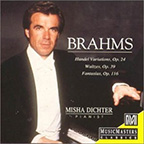 |
BRAHMS: Nimbus: NI 2578 |
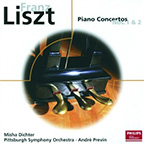 |
LISZT: André Previn/Pittsburgh Symphony Orchestra 2 Valses oubliées Philips: 420896-2 |
 |
MOUSSORGSKY: Pictures at an Exhibition Philips: 420708-2 |
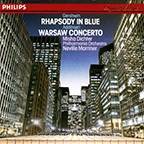 |
GERSHWIN: Rhapsody in Blue Neville Marriner/Philharmonia Orchestra Philips: 411 123-2 |
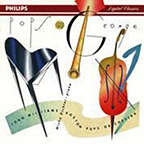 |
“POPS BY GEORGE” Gershwin: Rhapsody in Blue Philips: 4264004-2 |
 |
BEETHOVEN: Philips: 422-475-2 |
 |
LISZT: The 19 Hungarian Rhapsodies Philips: 416 463-2 |
 |
TCHAIKOVSKY: Piano Concerto #1 in b-flat, Op. 23 Erich Leinsdorf/Boston Symphony Orchestra RCA: 420708-2 |
 |
SCHUBERT: Sonata in A, Op. Posth., D. 959 RCA: LSC-3124 |
Liszt Complete Hungarian Rhapsodies
Reissued Rhapsodies might come as a welcome antidote to Cziffra’s swagger [headline]
Author: Bryce Morrison
This reissue of Liszt’s complete Hungarian Rhapsodies will do much to dispel sadly still-current notions of flashiness and empty display. Listening to Misha Dichter’s performances, dating from 1977-85, is to be reminded of qualities that support Stravinsky’s delight in the Rhapsodies while diluting Bartók’s suspicion of music he considered a fake national epic. Edward Sackville-West, co-author of The Record Guide, too, might well have qualified his view of the Rhapsodies as music marred by an “expensive glare and theatricality”. From Dichter everything is deeply considered, every musical possibility explored and this, combined with a comprehensive and unfaltering technique, makes the reappearance of his presentation a special contribution to the Liszt celebrations.
His delectably light-fingered dismissal of every heavyweight demand is complemented by an occasional imaginative flourish and interpolation (including a brief but amusingly gruff commentary at the cadenza point of No 2). He can thunder and whisper, coax and command with the best of them. However, for those who find Cziffra’s devastating swagger and scorching bravura (“as if a grenade had been tossed into the piano”) too much, Dichter may well supply an answer. I should add that I am grateful for the inclusion of Rhapsodies Nos 16-9, music of another, darker world, one tinged with the bitterness and desolation central to Liszt’s late years. Dichter has written his own inspiring essay and Newton Classics’ transfers are as clear as a bell.
GRAMOPHONE
Misha Dichter. The Complete RCA Victor Recordings. A 2 CD album. Sony Classical [headline]
Sony’s 3 CD release of Misha Dichter’s complete RCA recordings, made between 1966-69, remembers a pianist who performances were blessed with an exhilarating strength and clarity and always with a natural, unforced instinct for poetry. And here, whether in Beethoven, Schubert, Brahms, Tchaikovsky or Stravinsky he remains vividly in touch with the composer’s inner pulse and spirit. All in all, these records should be in every musician’s collection. You can never have enough of playing of this calibre.
GREAT MUSICIANS - THE ART OF PIANISTS
Bernstein’s Age of Anxiety highlights Zinman’s Ravinia program [headline]
It was a pleasant surprise to see Leonard Bernstein’s Symphony no. 2 appear on Tuesday night’s CSO program at Ravinia. Titled The Age of Anxiety after its inspiration in W.H. Auden’s poem of the same title, Bernstein’s second symphony features a daunting part for solo piano, given a bracing account by Misha Dichter. In ‘The Masque,’ with its jazzy rhythms and good humor seemingly so out of place, Dichter’s speedy fingers played with a wonderful abandon. Dichter had one last shining moment in the muscular cadenza which obliquely suggests previously heard ideas, and in the work’s final moments, faith is introduced, glowing in its opulence. The Age of Anxiety is a staple of Dichter’s repertoire and he was undeniably impressive.
BACKTRACK.COM
What a pleasure it was to work once again with Misha Dichter and to perform Bernstein’s Age of Anxiety with him and the Chicago Symphony Orchestra. I hope I will have many more opportunities to work together with this outstanding artist in the coming years.
DAVID ZINMAN, Ravinia Festival guest conductor
A ravishing performance. Mr. Dichter’s reading [Schubert Sonata in B-flat] was that of a flesh-and-blood poet, gently inflected, keenly felt, and executed with breathtaking polish from start to finish.
THE NEW YORK TIMES
In three of Liszt’s Hungarian Rhapsodies, Dichter could do no wrong. Here the pianist was clearly in his element–the virtuoso doing what he does best, dazzling on the high wire with only a rapt audience below.
THE WASHINGTON POST
RPO’s Bernstein Celebration [headline]
Dichter played beautifully, and piano and orchestra told the story [Bernstein Age of Anxiety] in a well-integrated fashion. Not surprising for a pianist who has been a favorite hear for decades in more traditional repertoire, Dichter seemed more comfortable with the music’s Brahmsian elements. The ‘Masque’ was exciting, however, Dichter played the piece’s reflective sections with sensitivity and exquisite tone. Overall this was an intelligent and effective account of a fascinating work.
ROCHESTER CITY NEWSPAPER (NY)
Mr. Dichter’s major offering was the middle of the last three sonatas of Schubert, the A major, D. 959. He is a ‘big view’ pianist, who I feel sometimes lets his viruosity run away with him when more contemplation would be nice. On the occasion, just when I was starting to get antsy, he would do something so angelic that it brought tears to my eyes. For example, the return of the lonely wanderer theme in the second movement was heart-stopping. He also handled the multiple remote-key visionary ‘farewells’ in the Rondo finale beautifully. The audience went wild. Mr. Dichter proved that he still owns the keyboard, and I wish him many more years of fruitful artistry.
NEW YORK CONCERT REVIEW
Misha Dichter’s performances with the Las Cruces Symphony Orchestra were spell-binding. A true musician’s musician. Flawless technique, beautiful sound, soaring musical lines and a very thoughtful interpretation without the usual musical cliches. Simply put, his rendition of Gershwin’s Concerto in F was magnificent.
DR. LONNIE KLEIN, Music Director
Las Cruces Symphony Orchestra (NM)
To his virtuosity, Dichter adds his artistic maturity, a depth of musical awareness and strength of artistic vision.
CHICAGO SUN-TIMES
Dichter’s right to the top place among American pianists was confirmed by everything he did in the Beethoven.
MONTREAL GAZETTE
Symphony’s tribute to Leonard Bernstein is a festival high note [headline]
The Age of Anxiety was given a reading of comprehensive sympathy and enormous verve, adorned by Misha Dichter’s fluent piano solo.
THE SEATTLE TIMES
The guest soloist, the dashing pianist Misha Dichter, was an impressive ‘get’ for the Philharmonic, and the Romantic favorite [Grieg Piano Concerto] was an almost Olympian showcase for the impressive soloist.
LAS VEGAS SUN
The pianist commands a wide dynamic and emotional range, finds nuances as well as new insights in all the music he plays, and places his details carefully. Dichter’s tremendous authority at the keyboard is the result of a comprehensive technique combined with an astute musicality.
LOS ANGELES TIMES
Stupendous strength and brilliance; nothing was ever done just for the sake of effect. As an interpreter, Mr. Dichter combined romantic fervor with princely self-discipline.
THE TIMES (London)
It would be hard to imagine a more thrilling concert than the one that featured one of the world’s most distinguished pianists, Misha Dichter, performing one of Beethoven’s great keyboard calling cards, the Piano Concerto No. 3. His interpretation was revelatory. Far too many pianists view this piece as a dark, melodramatic dazzler, but Dichter emphasized the work’s most endearing lyrical qualities, saving his fireworks for the appropriate places, the first movement cadenza and the finale.
DEMOCRAT & CHRONICLE (Rochester, NY)
Not less convincing and enthralling was the passionate interpretive enthusiasm in the Quintet in E-flat of Schumann, a confrontation of strings with brilliant incisiveness of accents over the exuberant dynamism of Misha Dichter at the piano. A sensational success, and a well deserved approval from the public.
CORRIERE DELLA SERA (Italy)
One of the finest pianists of his generation–or of about any generation, for that matter
THE INDIANAPOLIS STAR
As his name suggests (Dichter is German for poet), the pianist’s performance was poetry from beginning to end. Dichter was sensitive to balance but was not shy when the music called for lyrical strengthor technical brilliance.
THE SALT LAKE TRIBUNE
He made a dignified soloist in the Bartok [Concerto #3], playing with clean execution, luminous clarity and decorous reserve.
ST. LOUIS POST-DISPATCH
Piano Master Misha Dichter Astounds at Boston Conservatory [headline]
La lugubre gondola No. 2, of Liszt, 15 Hungarian Peasant Songs of Bartók, and a Scriabin encore completed Dichter’s awe-evoking recital in Boston, his first after a 15-year absence. Who would have ever dreamed that this master of the piano had had a serious bout with Dupuytren’s Disease, undergone surgery in recent years, only to rebound and play as he did, delivering a rock-solid, brilliantly bold and down-to-earth performance of some of the most difficult piano pieces in existence?
THE BOSTON MUSIC INTELLIGENCER
| 4/19/2024 (7pm) | TRANSYLVANIA STATE PHILHARMONIC ORCHESTRA David Itkin, conductor Rachmaninoff: Rhapsody on a Theme of Paganini |
| 5/18/2024 (4pm) 5/19/2024 (4pm) |
BARGEMUSIC The Barge (Brooklyn, NY) Duo-Recital with Mark Peskanov, violinist |
| 6/30/2024 (3pm) | MUSIC MOUNTAIN (Falls Village, CT) Gordon Hall Schubert: Grand Duo for Piano Four-Hands |
| 11/24/2024 (2:30pm) | QUEEN’S UNIVERSITY (Kingston, ON, Canada) Bernstein Performance Hall, Isabel Bader Centre for the Performing Arts Brahms: 2 Ballades |
| 1/11/2025 (8pm) | OKLAHOMA CITY PHILHARMONIC ORCHESTRA Gerard Schwarz, conductor Grieg: Piano Concerto |
| 3/5/2025 (7:30pm) | UNIVERSITY OF NORTH TEXAS SYMPHONY ORCHESTRA (Denton) David Itkin, conductor Rachmaninoff: Rhapsody on a Theme of Paganini |
| 5/18/2025 (4pm) | TREETOPS CHAMBER MUSIC SOCIETY (New Canaan, CT) Carriage Barn Arts Center, Waveny Park Dvorák: Piano Quintet #2 |
| 6/8/2025 (3pm) | MUSIC MOUNTAIN SUMMER FESTIVAL (Falls Village, CT) Gordon Hall Dvorák: Piano Quintet #2 |
| 6/14/2025 (7pm) | MUSIC MOUNTAIN SUMMER FESTIVAL (Falls Village, CT) Gordon Hall Beethoven: Polonaise in C |
| 9/27/2025 (2pm) | BARGEMUSIC (Brooklyn, NY) Brooklyn Bridge Park Boathouse |
| 12/16/2025 (7:30pm) | PALM BEACH SYMPHONY (FL) Gerard Schwarz, conductor Rachmaninoff: Rhapsody on a Theme of Paganini |
| 1/25/2026 (2pm) | PALM SPRINGS CONCERTS (CA) Richards Center for the Performing Arts at Palm Springs High School |
